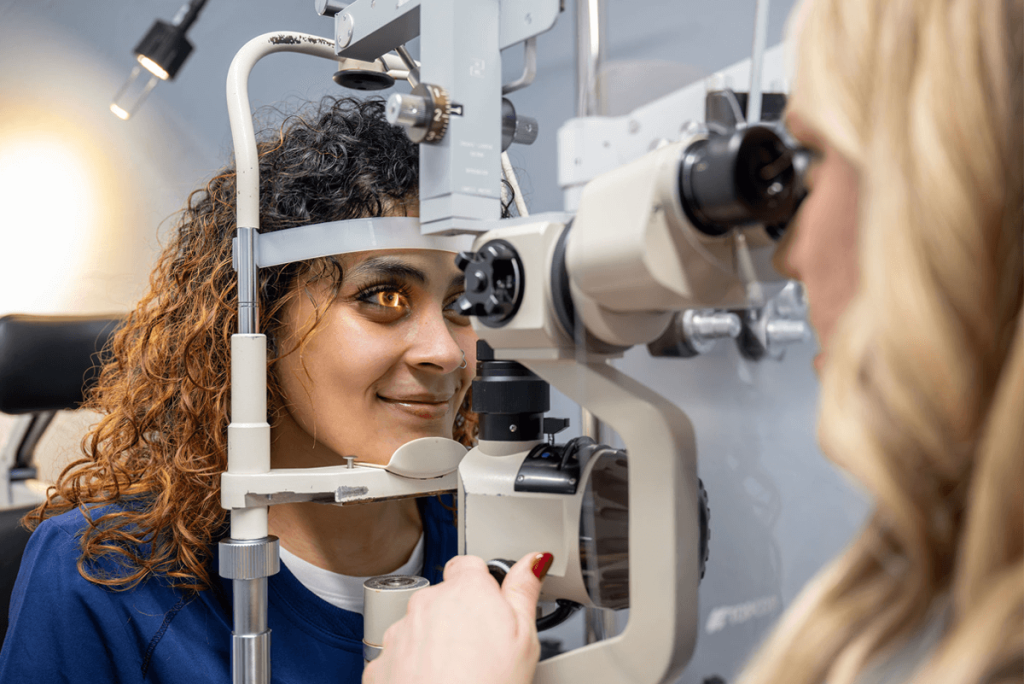Eye Allergies: Symptoms and Treatment
Eye allergies can cause redness, itching, and discomfort, affecting your daily life. At Eyes on Group, we diagnose and treat a variety of allergies using advanced techniques. Our goal is to provide relief through personalized care and effective treatments.
Eye allergies, also known as allergic conjunctivitis, occur when your eyes react to allergens like pollen, dust, mold, or pet dander. When exposed to these triggers, your immune system releases histamines, causing inflammation, redness, and burning eyes.
- Seasonal Allergies: Common during spring and fall due to increased pollen in the air.
- Chronic Allergies: Persist year-round, often triggered by dust mites, mold, or indoor allergens.

The symptoms of eye allergies can range from mild to severe, including:
- Itchy eyes: Persistent irritation and the urge to rub your eyes.
- Red eyes: Inflammation caused by histamine release.
- Burning sensation: A common complaint, especially in dry or windy conditions.
- Watery eyes: Excessive tearing in response to allergens.
- Swollen eyelids: Puffiness around the eyes due to inflammation.
- Sensitivity to light: Increased discomfort in bright environments.
If you’re experiencing severe eye allergies, it’s essential to consult an eye specialist to determine the best treatment plan.
While eye allergies can be unavoidable, especially during high pollen seasons, several strategies and treatments can help alleviate symptoms:
At-Home Remedies
- Avoid Allergens:
- Stay indoors when pollen counts are high, particularly in the morning and evening.
- Use air purifiers to minimize indoor allergens.
- Wash your hands and face frequently to remove allergens.
- Keep Your Environment Clean:
- Remove rugs and carpets that trap dust.
- Regularly clean and vacuum your home to reduce allergen buildup.
- Change air conditioning filters to maintain clean airflow.
- Cold Compress:
- Applying a cold compress to your eyes can reduce swelling and soothe irritation.
Over-the-Counter Solutions
- Artificial Tears: Help flush out allergens and soothe dryness.
- Antihistamine Eye Drops: Relieve itching and redness by blocking histamine release.
Prescription Treatments
For persistent or severe symptoms, an eye doctor may recommend:
- Steroid Eye Drops: For intense inflammation and discomfort.
- Oral Antihistamines: To manage systemic allergic reactions.
- Immunotherapy: Allergy shots or other treatments to desensitize your immune response.
If your symptoms are not improving with at-home remedies or over-the-counter treatments, it’s time to consult an eye specialist. Untreated allergies can lead to chronic irritation and even damage to the eye’s surface.
Our offices in Worcester, Randolph, Lincoln, and Cranston are equipped with advanced diagnostic tools to pinpoint the cause of your allergies and offer tailored solutions for lasting relief.
Proactive measures can help reduce your risk of developing red, itchy eyes from allergies:
- Wear sunglasses outdoors to shield your eyes from pollen.
- Wash bedding frequently to remove allergens like dust mites.
- Avoid touching or rubbing your eyes, which can worsen irritation.
- Use hypoallergenic products and cosmetics to minimize exposure to irritants.
Don’t let itchy, sore, or burning eyes from allergies disrupt your life. Visit our advanced eye offices in Worcester, Randolph, Lincoln, or Cranston for a comprehensive evaluation and personalized treatment plan. Our team is dedicated to helping you achieve clear, comfortable vision, even during allergy season.